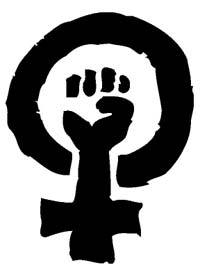Meghan Murphy last June: The sex industry’s attack on feminists.
Pornographers have long defended the products and practices of their extremely profitable industry as “free speech,” even as they sexualize male power and violence against women. Similarly, defenders of prostitution, which they strategically call “sex work,” frame the movement for its legalization and normalization as liberatory.
But they don’t want free speech for their critics. Last March
a number of prostitution lobby groups threatened to boycott a conference in Vancouver, British Columbia, that had secured the renowned journalist and Truthdig columnist Chris Hedges as a keynote speaker. Because Hedges had written an articlecalling prostitution “the quintessential expression of global capitalism,” these groups attempted to no-platform Hedges and would have succeeded in their efforts if not for an impassioned responsefrom local women’s groups.
Pornographers went after Catherine MacKinnon and Andrea Dworkin in the 90s, too.
In order to appeal to well-meaning progressives, a “sex-worker rights” movement was invented to oppose those feminists who believed prostitution to be an extension and perpetuation of male power and violence. The prostitution lobby adopted the language of the labor movement in order to advocate for men’s rights to open brothels and buy sex from women, and it also adopted the language of the feminist movement to frame prostitution as a woman’s choice.
They have the media on their side, as well as the pimps and johns. The capitalist interests of mainstream media mean that pornography and prostitution are presented simply as business ventures, and their patriarchal foundations mean that the idea of women’s bodies as consumable objects is accepted as the norm.
So all women are seen as objects for consumption, either good ones if they’re gorgeous and hot, or bad ones if they’re ugly and cold. In neither case are they people with their own plans and ideas.
While manipulative language designed to appeal to the liberal masses is a huge part of advocacy to decriminalize pimps and johns, another key component is the smearing of feminists who challenge this discourse.
Industry advocates will stop at nothing to silence the voices of those who speak out against their interests. Labeled as prudes, religious conservatives, oppressors and bigots, the war against these feminists has recently culminated in widespread efforts to no-platform dissenters.
When the Swedish journalist Kajsa Ekis Ekman was scheduled to speak in London last year about her book “Being and Being Bought: Prostitution, Surrogacy and the Split Self,” the bookstore hosting the event was threatened with boycotts.
Was she labeled a SWERF? I’d be amazed if not.
The current climate in “Anglo-Saxon feminism” is one that supports witch hunts, Ekman told me. Such a witch hunt begins with “smear campaigns, appears to be coming ‘from below,’ and calls famous feminists power-crazed, elitist, ‘cis-sexist,’ racist and ‘whorephobic,’ ” she said. “It then proceeds to full-blown silencing campaigns, boycott threats, petitions, isolation of anyone who sides with the feminist and guilt by association.”
We’ve seen that happening. Repeatedly.
Prostitution survivors face silencing tactics as well. Bridget Perrier, a First Nations educator and co-founder of the Toronto-based sex-trade survivors and abolition group Sextrade101, said the efforts of the pro-prostitution lobby are focused on invalidating the experiences of women who have left the industry. Their stories are often called into question.
Rachel Moran survived seven years in the sex trade in Ireland and has published a book about her experiences, addressing many of the myths and lies perpetuated by the sex-work lobby. For her crime—speaking the truth—she has been subjected to endless harassment, accused more than once of inventing her story.
“I have been defamed, slandered, threatened, physically confronted and screamed at,” Moran told me. “I’ve had my home address, bank details and personal email circulated amongst some of the most seemingly unhinged people, who have tweeted me portions of my home address in a clear we-know-where-to-find-you style threat.”
This is the world we live in now.
The denial of truths that would hurt efforts to present a sanitized version of the sex industry aimed at selling prostitution as “simply a job like any other” is key to the campaign for its legalization.
Moran told me she was shocked at the lack of compassion exhibited toward her by sex-industry advocates who claim to have a vested interest in women’s safety. “They simply do not give a damn that they are constructing a deliberate and organized bullying campaign against a woman who was ritualistically sexually abused by adult males since she was 15 years old,” she said. “My truths do not suit them, so my truths must be silenced.”
And Murphy gets the treatment too.
In desperation, unable and unwilling to respond to basic feminist, socialist arguments against the sex industry—namely, that it exists on a foundation of male power and capitalism, perpetuating misogynist notions about male “needs” and women’s bodies as the things that exist to satisfy these socialized desires—these lobby groups resort to lies and slander.
These groups try to pass smear campaigns off as “critique,” but they are anything but, Ekman, the Swedish journalist, said. “What is going on now is not critique. Rather, it resembles a full-scale Maoist cultural revolution.”
“If you are a prominent feminist, you won’t escape this,” she continued. “If you haven’t been targeted yet, you either will be or you’re not dangerous enough.”
I have been writing about the sex industry and prostitution legislation in Canada for years now. The attacks on my character and work have been relentless. In recent weeks, a number of Canadian sex-industry lobby groups mounted a major smear campaign online, framing arguments against the objectification, exploitation and abuse of women as “bigotry” and willfully distorting my work and views beyond all recognition.
The nonsensical and baseless accusations hurled at me—“transphobic,” “whorephobic,” racist and so on—replicate those used against all women who challenge the status quo in this way. The intention is not justice, but to slander feminists so that their arguments can be ignored and dismissed and in order to bully others into doing the same.
And, in this looking-glass world, people who think they’re ardent progressives join the bullying.
In her essay “Liberalism and the Death of Feminism,” MacKinnon wrote that “once there was a feminist movement”—a movement that understood that criticizing practices like rape, incest, prostitution and abuse was not the same as criticizing the victims of these practices. “It was a movement that knew [that] when material conditions preclude 99 percent of your options, it is not meaningful to call the remaining one per cent—what you are doing—your choice.” She wrote these words 25 years ago, and we are still fighting the same battles. Now, to speak out against patriarchal systems means your livelihood will be threatened, as well as your credibility and your freedom to speak.
You cannot claim to be progressive but advocate against democracy. You cannot claim to be feminist but support the silencing of women. This new McCarthyism will not liberate us. It offers us up to those who work toward our demise.
Oh well, we’ll always have the Kardashians.






